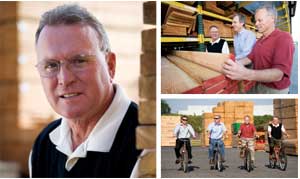Wayne Carver
Stephens has many of the homey touches and personal quirks found at smaller dealers across the U.S. But if Peter Ganahl views his $291 million business like a small company, Wayne Carver manages his $25 million operation like one a dozen times as big. He oversees the place as a true chief executive, entrusting large amounts of responsibility to the trio that manage the company’s three divisions–building materials, hardware, and lighting–as well as handing over all purchasing authority to an employee.
Unlike Ganahl and Beisser, Carver didn’t inherit Stephens; he’s a professional manager hired by the founder’s sons. “My responsibility to these guys [on staff] is to be their coach,” he says. “My responsibility to the Stephens brothers is financial.”
While Carver thinks big, he faces the same limitations on yard size, market territory, volume of business, cash flow, and capital spending that can crimp many small LBM dealers. And just as in other small towns, the business is intensely personal. “In a lot of cases, our employees’ kids are in school with the customers’ kids,” he notes. Every charitable cause in town counts on Stephens for a donation.
On Tobacco Road
Fuquay-Varina gets its name from the 1963 merger of the spa community known as Fuquay Springs and the nearby but separate railroad stop of Varina. By the time that happened, Isaac Stephens’ farm supply store near the rail depot and the tobacco auction market was nearly 30 years old. Today’s Fuquay-Varina remains small, with a population of just 12,200 as of 2005, but it’s also booming, having grown more than 50% since 2000 thanks to the burgeoning Research Triangle area just up U.S. 401. Stephens’ service area extends about 20 miles from the yard.
Because of the strong base of business in that area, “in talking to other dealers, I feel blessed,” Carver says. But it also means he has to change his thinking to keep up with the times. One example: the dealer’s lighting showroom, which in just a few years has grown into a $3 million business. Glancing at the mix of high-end and plain-Jane fixtures, Carver notes: “We have people for whom money is no object. But we also have people who have a $500 budget [to buy all their lighting].”
Market Intelligence
Carver is a strong believer in numbers-based management–he can quote population and realtor studies from memory, and his first tasks upon arriving at 7:30 a.m. every day are to check the bank account and the sales reports. But he also relies on what he sees and hears from walking around during working hours as well as from stopping by the store on weekends. He visits the contractor’s desk several times a day so he can chat with builders and pick up the latest gossip from his sales team. This Monday morning, for instance, a longtime local builder gives him some of the first reports he’s heard of a sales slowdown–ironically, not because there’s less demand locally, but because people who are moving into the area can’t sell their homes elsewhere.
Like many small yards, the Stephens property is relatively small (11 acres total, a fifth of what Ganahl owns and one-third of Beisser’s property), broken up (the lighting center is across a busy street, while a storage facility is a quarter-mile away), and not exactly state-of-the-art. Roughly half the yard is unpaved and kicks up more dirt than Carver would like. He’d love to pave it, but even with the Stephens family’s willingness to not tap corporate profits for their own use, funds remain tight and other needs are more pressing.
Carver’s experience and open-minded attitude help him, and Stephens, survive. Many of the tricks he learned came when he ran the Greenville, S.C., flagship store for Builder Marts of America, now part of Guardian Building Products.
So you then try things and see if you can make ’em work.” He further honed his skills by running a pro dealer in Manteo, N.C., on the Outer Banks, from 1992 to 1999 before coming to Stephens. He sits on a roundtable organized by the Southern Building Material Association, and whenever he’s on the road and sees a lumberyard he tries to drop in.
Outside Influences
But no matter how skilled you are, when you’re a small yard it’s harder to evade a punch. Four years ago, The Home Depot opened a store less than a mile away and took a third of Stephens’ retail business. The return of loyal customers combined with growth in the area to help buoy Stephens. Then the store was rocked again when the retail manager had an opportunity to buy his own place, and he took the assistant retail manager with him. “We had to rebuild our staff,” Carver says.
Like Ganahl, he relies on affiliations and outside help. Stephens is an Ace affiliate–”with only a 20,000-square-foot hardware store, we needed the Ace name,” Carver says–and belongs to the ENAP buying group. (Similarly, Ganahl tapped Do it Best’s expertise for two store redesigns. Beisser doesn’t belong to any buying groups.) Carver outsources his accounts receivable collections to BlueTarp Financial, thus saving the cost of half a staffer.
He’s particularly supportive of a “corporate chaplain” program based in nearby Wake Forest, N.C. For about $10 per employee per month, the chaplain comes in one day a week just to talk with employees about any personal issues on their minds. The chaplain even goes to visit one ex-worker now in jail. Carver views the funding of such a program as part of being a corporate family.
Like Ganahl and Beisser, Carver thinks about succession, but unlike the other two he doesn’t feel the weight of family history. Now 61, he imagines a life in which he would take Fridays and Mondays off and go traveling around in a mobile home. No doubt he’ll stop at a few lumberyards along the way.
–Craig Webb

